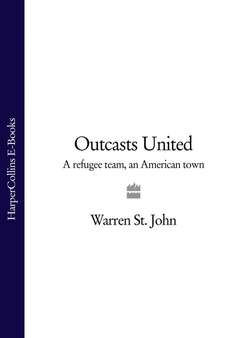Читать книгу Outcasts United: A Refugee Team, an American Town - Warren John St. - Страница 13
Chapter Seven “Coach Says It’s Not Good”
ОглавлениеOn September 26, 2005, a weary twelve-year-old boy named Bienvenue Ntwari slowly opened the door of his Clarkston apartment and, squinting against the sudden blinding light of the midday sun, took his first real look at America. Two days before, Bienvenue had set out with his mother, Generose, his older brother, Alex, and younger brother, Ive (pronounced EE-vay), from a refugee camp in Mozambique.
The family landed in Atlanta at night. They wandered off the airplane into a vertiginous swirl of strange images, sounds, and languages. They walked through the long corridors of the airport, past moving sidewalks, blinking murals, stands of strange-looking food, and a rush of people who all seemed to know exactly where in all that chaos they wanted to go. The family was met eventually by a caseworker from the International Rescue Committee, who helped them load their things into a car and drove them past the shimmering towers of downtown Atlanta, toward Clarkston. Along I-20, a vast and open superhighway that divides Atlanta into north and south, cars glided past with improbable speed. The streets in America were bizarrely smooth. From within this quick-flowing hallucination, it was impossible to make much sense of the images flowing by the windows. It was as if the family had been beamed magically from one world to another; they had little feeling for the miles traveled, the continents or oceans crossed, or the time elapsed. After a thirty-minute ride, the caseworker pulled into the Willow Ridge apartment complex, an assemblage of two-story buildings that sits atop a hill and abuts the roaring interstate highway they had just exited. The parking lot was quiet. Street lamps cast eerie pink-tinted orbs of light on the cracked asphalt. There was no one around. The family unloaded the car in a daze and followed the caseworker through a doorway hidden in a dark recess beneath a stairwell and into a bare-walled ground-floor apartment with mattresses on the floor. Generose, Alex, Bienvenue—“Bien” to friends and family—and Ive collapsed onto the mattresses and slept.
AS INTERMINABLE AS the journey was, it was really just the final leg of a wandering that began nearly five years before in Bujumbura, the bustling capital of Burundi, where Generose grew up and raised her boys. Bujumbura sits alongside the tranquil waters of Lake Tanganyika, at the foot of a fissured mountain range that rises sharply out of the flats and glows orange on clear days, when the sun sets over Congo to the west.
Burundi, the size of Connecticut and home to some 8.5 million, lies south of Rwanda, east of Congo, and north of Tanzania and is among the poorest countries in the world. In 2005, the annual per capita gross domestic product of the country was a mere four hundred dollars—which ranks it ahead of only the Democratic Republic of Congo and Zimbabwe among nations for which any data is available. As in Rwanda, a Tutsi minority had ruled over a Hutu majority in Burundi, with the blessing of the country’s colonial stewards—first Germany and later Belgium—and continuing after independence in 1962.
In the early 1990s, though, hope for ethnic reconciliation began to emerge. In 1993, with the country’s first free elections and the election of the country’s first Hutu leader, a moderate intellectual named Melchior Ndadaye.
Four months later, in October 1993, he was assassinated by Tutsi hardliners. Soon after his death was announced by radio, enraged Hutus took their revenge on Tutsis, killing scores. Firmly in control of the military, Tutsi hardliners responded in kind, wiping out whole villages of Hutus. This tit-for-tat violence soon blossomed into all-out massacres. Within a year, 100,000 were dead. In the creeping ten-year civil war that followed, some 300,000 died, and countless tens of thousands fled into the mountains and into refugee camps in Tanzania and Mozambique.
In 2000, the killing was still going on. Hutu rebels fought for control of Bujumbura. Generose, fair skinned and with narrow facial features that identified her as a Tutsi, fled the city with her boys.
The family made it to Mozambique, where they lived for four years in two separate camps, hoping the whole time to hear from the United Nations office there that their application for asylum had been accepted. That day came in August 2005. The family learned they would be going to the United States, to a place called Atlanta, of which Generose was only faintly aware. She told her boys the news about two weeks before they were to depart, with strict instructions to tell no one.
“My mom told us not to go around the camp too much because she thought they might do something bad to us because they were jealous,” Bien said.
